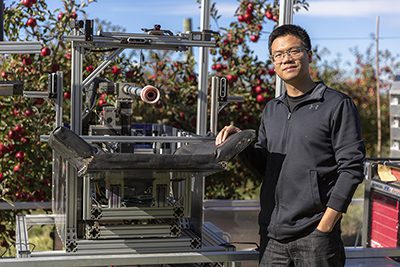Research Roundup: robotic harvesting, cleaner water, and more
The College of Engineering is among Michigan State University’s top producers of research discoveries and commercialization that help build a diversified economy and generate jobs for Michigan and the region. Highlights of some of the college’s newest research grants and gifts, which total $11.5 million, are here:
LETTING ROBOTS HARVEST THE APPLES
“Development of an Automated and Integrated Mobile System (AIMS) for Apple Harvest and In-field Sorting”

• MSU and partners received $3.5 million from the USDA Specialty Crop Research Initiative Program (SCRI) for the development of an Automated and Integrated Mobile System (AIMS) for Apple Harvest and In-field Sorting over four years. The collaboration brings together the expertise of USDA, MSU, Penn State, and Washington State. Zhaojian Li, Red Cedar Distinguished Associate Professor of Mechanical Engineering at MSU, is the principal investigator (PI) and lead developer of the efficient robotic harvesting project. Read more and see more on YouTube: https://youtu.be/tekrEG0NBKk.
Additionally, Li and his team are the winners of the 2023 American Society of Agricultural and Biological Engineering (ASABE) Engineering Concept of the Year, a major award to recognize their contributions to robotic technologies for fruit harvesting.
IMPROVING THE WORKPLACE FOR PEOPLE WITH DISABILITIES

“Improving Disability Inclusion in the Workforce Through Assessment and Augmentation of Individual Abilities and Workflow Redesign in Real-World Contexts”
• PI Ranjan Mukherjee, interim chair and professor of Mechanical Engineering, and a team from the College of Engineering, College of Business, and College of Education have been awarded a $2 million NSF grant assessing and augmenting ways to redesign workflow to improve disability inclusion in the workforce. The researchers include Charles Owen, Computer Science, Sriram Narayanan, Supply Chain Management, Rajiv Ranganathan, Kinesiology, and Hung Jen Kuo, Vocational Rehabilitation Counselling.
PREDICTING WATER SAFETY
“Optimizing Drinking Water Disinfection to Minimize Opportunistic Pathogen & DBP Risks”
• PI Jade Mitchell, associate professor of Biosystems and Agricultural Engineering, will use a $2.1 million grant from the U.S. Environmental Protection Agency to better understand and predict the occurrence of opportunistic pathogens and disinfection by-products in drinking water distribution systems and the associated health risk tradeoffs posed by them. Research objectives are to develop a strategic sampling program based on health data, characteristics, and occurrences.
TEACHING NEW TEACHERS
“Intelligent, Adaptive Program with Just-in-time Feedback for Preservice Teachers”

• MSU Foundation Professor of Computer Science and Engineering Jiliang Tang and researchers from the University of Southern California and the University of Georgia Research Foundation will improve evidence-based teaching practices for preservice teachers by leveraging AI, especially ChatGPT, thanks to a $2 million NSF grant. The program will be developed and refined through an interactive and conversational design. Such design enables human-in-the-loop learning to incorporate feedback from instructors of mathematics courses and from preservice teachers.
EXTENDING SECURE CELLULAR NETWORKS
“Exploring the Non-Standardized Polices, Operations, and Requirements for 5G Cellular Networks and Beyond: Advancing the Modeling, Tools, and Evaluation”
• PI Guan-Hua Tu and Co-PI Hui Liu, assistant professors of Computer science and Engineering, received a $600,000 NeTS small grant for three years. The project’s broader significance and importance are to extend the state-of-the-art cellular network research to a new frontier, investigate original problems that entreat innovative non-3GPP standardized policies, operations, and requirements exploration, analysis, network modeling, data collection, data mining solutions, and pave the way for a new research endeavor to enable more robust, resilient, and secure cellular networks.
EXPLORING THREATS TO YOUR ALEXA
“Robust Speaker and Speech Recognition Under AI-Driven Physical and Digital Attacks”
• PI Qiben Yan, assistant professor of Computer Science and Engineering (CSE), with CSE Professor Li Xiao and Arun Ross, the Martin J. Vanderploeg Professor of Engineering, will use a $600,000 NSF grant to explore new cybersecurity threats to commercial voice assistants that consumers interact with regularly. These voice assistants have diverse applications across many critical sectors, ranging from smart homes and healthcare to e-commerce and self-driving vehicles.
ENHANCING LONG-DISTANCE, LOW-POWER COMMUNICATIONS
“Towards High-Performing LoRa with Embedded Intelligence on the Edge”
• Zhichao Cao, assistant professor of Computer Science and Engineering, is the PI of a $445,000 NSF grant to design a new long-range physical layer to enhance long-distance and low-power long-distance communications. Research will seek to correct long-range receivers that perform poorly when there is complex environmental noise.
OPENING UP OPEN RADIO ACCESS
“An Integrated Multi-Time Scale Approach to High-Performance, Intelligent, and Secure O-RAN based NextG”
• Huacheng Zeng, assistant professor of Computer Science and Engineering, has been awarded a three-year, $300,000 NSF grant to enhance the performance, intelligence, and trustworthiness of Open Radio Access Network (O-RAN). The research will tackle several fundamental challenges across its control loops of three different time scales.
About the MSU Innovation Center:
The MSU Innovation Center is dedicated to fostering innovation, research commercialization, and entrepreneurial activities from the research and discovery happening across our campus every day. We act as the primary interface for researchers aiming to see their research applied to solving real-world problems and making the world a better place to live. We aim to empower faculty, researchers, and students within our community of scholars by providing them with the knowledge, skills, and opportunities to bring their discoveries to the forefront. Through strategic collaborations with the private sector, we aim to amplify the impact of faculty research and drive economic growth while positively impacting society. We foster mutually beneficial, long-term relationships with the private sector through corporate-sponsored research collaborations, technology licensing discussions, and support for faculty entrepreneurs to support the establishment of startup companies.
Is your company interested in providing further support to MSU’s College of Engineering? Click Here.
